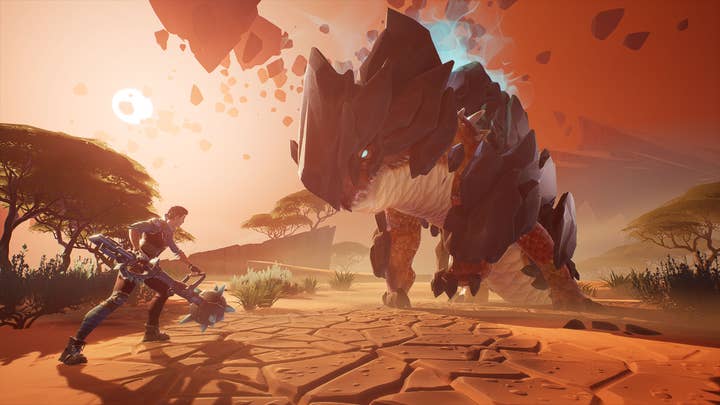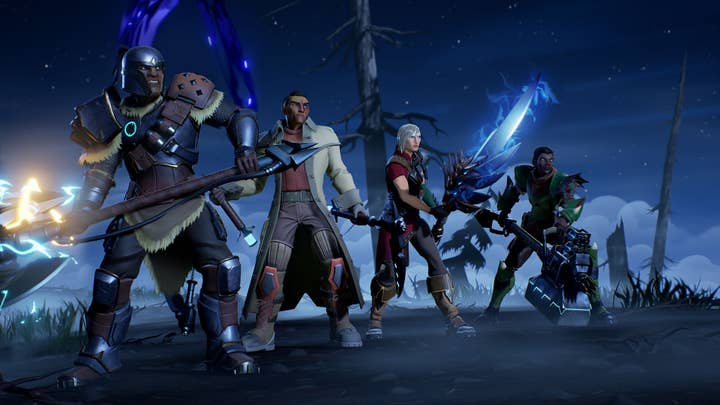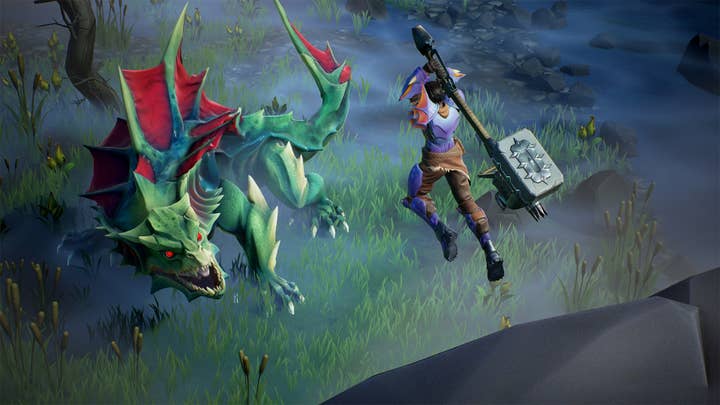Phoenix Labs' undaunted quest for cross-platform play
Founder Jesse Houston on choosing the Epic Games store over Steam, and how that choice is helping to realise its cross-platform vision for Dauntless
After Fortnite and Rocket League, the next logical contender for true cross-platform play across all three major consoles and PC seems should be the likes of Minecraft. But thanks to some help from the industry's newest PC storefront, it may instead be a free-to-play, monster hunting RPG from Canadian studio Phoenix Labs.
Dauntless launched in open beta on PC nearly a year ago. It is Phoenix Labs' first title since it was founded in 2014 by ex-Riot developers Jesse Houston, Sean Bender and Robin Mayne. As of late last year, the studio had approximately 90 full-time developers working on the game, a number that rose to 200 counting contractors and outsourced labor.
All that work will lead to a full release sometime this year, and Phoenix Labs is aiming for Dauntless to be fully cross-platform across Xbox One, PS4, PC, and later on Nintendo Switch and mobile. Speaking to GamesIndustry.biz at GDC 2019, Houston says getting cross-platform play to work has been one of the biggest challenges the studio has faced so far, but its efforts are nearing successful completion thanks to a recent new partner -- Epic Games.
"I've had this vision for Dauntless since the get-go: Wherever you are, whoever you want to play with, whatever device you want to play on, you can"
"I've had this vision for Dauntless since the get-go, of One Dauntless [the game's single account system across all platforms]," he says. "Wherever you are, whoever you want to play with, whatever device you want to play on, you can. This was even before Epic started doing the cross-platform play stuff. So Epic said they were doing cross-platform play and offered to teach us the ropes."
Dauntless' open beta on PC began not on the Epic Games store or even Steam, but as a standalone, self-published game downloadable through its own website. Initially, Phoenix Labs avoided storefronts both to ensure it entirely owned the publishing process, but also because there wasn't a storefront out there that quite aligned with its plans.
"We have a very particular vision for the experience we want our players to have in terms of how their data is used, their views on privacy, how customer service works, and the end-to-end user experience," he says. "Other companies that have these big platforms, whether it's Steam or the other folks, the views just didn't align. They're not bad, they're just not well-aligned. We're also a free-to-play game, and a bunch of platforms don't support microtransactions, whereas Epic started with that."

The views of the two companies aligning was, Houston says, the crux of it. Houston is no stranger to working with Epic; he's been making games in Unreal Engine since Splinter Cell during his time in production at Ubisoft. That past familiarity was what led Epic to reach out to Phoenix Labs around a year ago, in a phone conversation that easily sold Houston on the partnership.
"I don't think I've ever talked to someone who aligned so well with our vision as Epic did"
"I don't think I've ever talked to someone who aligned so well with our vision: players being the most important thing, being good to your community, and having a principled view on how game development should work and how we should always endeavor to do right by our players. I was sitting there listening to Tim [Sweeney, Epic CEO]'s vision and thought, 'I want to be a part of this.' It was logistics at that point."
With Dauntless soon moving to the Epic Games store on PC -- a process Houston says tech-wise was, "done in a matter of days" -- Houston believes the choice was well worth it; both from a personality perspective and also due to the high level of support and communication between Epic and its partners.
"To use awful management terms, it's been synergistic. I've been to Raleigh about a half a dozen times since we signed up, and it's 100% them helping us with whatever we need, whether it's platform support or Unreal issues or community things. Our data scientists talk every other week."
That high level of communication and assistance was critical to getting cross-platform play for Dauntless to work. If all goes according to plan, Dauntless will launch later this year on Xbox One, PS4, and PC, with Nintendo Switch and mobile support planned later on. It will be the third ever game to feature cross-platform play between the three major consoles.
The reason why it remains so rare mostly falls on Sony, which has been notably strict about allowing games on its system to talk with Xbox One and Nintendo Switch. Houston says that, initially, when Phoenix Labs approached Sony about cross-platform, the answer was a firm no. Now, thanks to Phoenix Labs' own work on Dauntless and Epic's advocacy following Fortnite's success, Houston says the cross-platform situation has been upgraded to 'probably.'
"I think Sony got some undue backlash because there is a big interest in cross-platform"
But despite the extra work, Houston doesn't blame Sony for being stringent about cross-platform on its hardware. The process to get it all working properly is far more complicated than most people think, he says, and it has all kinds of implications for platform-holders that need to be addressed.
"There are a lot of interesting user experience challenges that most folks don't quite understand. How does a player who logs into Xbox but doesn't log into a shared account interact with another player from PlayStation who does the same? How do they become friends? There's a ton of player management and making sure that if a player doesn't want to interact with another player off-platform, we have to make sure they don't. There are a ton of edge cases; each platform has specific rules on how friends are displayed and how chat messages get filtered. There's no rulebook for this.

"Sony has a vision for player experience, and the way it ensures that players have an optimal experience is through having a rigorous set of certification rules. A lot of these cross-platform systems break these rules inherently. Justifiably, Sony is trying to take it slow and understand what's working and what's not, rather than just throw open the floodgates.
"The last few years, the PC storefronts have been more like storefronts and less like curated experiences"
"I think Sony got some undue backlash because there is a big interest in cross-platform... Because most folks haven't gone down the path of doing cross-platform play [and] they don't understand all the nuance and difficulty of getting it done. They just see it as, 'Well it's just a waiver, give it to us.' Well, no. How do you do payment handling? What happens if a player buys something on one platform and goes to use it on another, how do you reconcile that revenue? There are tax implications. There are a lot of challenges and they're just trying to be measured I think."
With all the benefits Dauntless has seen, it's no surprise that Houston is optimistic about the Epic Games store in general. He acknowledges multiple times during our discussion that Steam and other storefronts certainly have their benefits, but in terms of curated, developer-focused experiences, Epic has the potential to cause a permanent shift for the better in how PC games are bought, sold, and supported.
"The last few years, the PC storefronts have been more like storefronts and less like curated experiences," he says. "There hasn't been a meaningful push to create a curated experience for a target audience. Steam's been this behemoth that hasn't meaningfully had to innovate in a big way in the last five years. A lot of Steam still feels the same, from content controls to curation to moderation and all these other things. It's been very reliant on the algorithm.
"If you're a PC-first developer, you've been stuck in this world of just having to be on Steam, and Steam is going to get its 30% come hell or high water. For a long time that was okay, and Valve earned its revenue share, but now it seems you can get a lot of the same stuff for less.
"As a guy who likes to do data in my spare time, I get the mindset. But it's nice to see Tim and the folks at Epic come forward and want to have a really curated experience and be a meaningful competitor, and then put their money where their mouth is."









